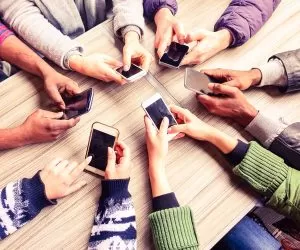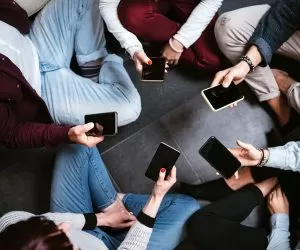Bad Effect of Smartphone? (6 Things You Don’t Even Suspect)
Lately, there has been an increasing concern about the bad effects of smartphone, on both individual and societal levels.
Parents, teachers, guardians, and different organizations are highly apprehensive about the impact of smartphones and mobile devices on human health and life.
This has led to many research studies and surveys to examine the cause and effect of smartphones in our daily life. Many studies have highlighted how excessive cell phone use can negatively impact our daily lives and health.
Smartphones have definitely changed our lives. While there are many benefits of cell phone that we experience in our everyday lives, it has its downsides too.
This article discusses the various ways cell phones are negatively impacting our lives.
Contents
1. Smartphones Can Make You More Vulnerable To Certain Diseases
We carry smartphones everywhere. Whether you are going to school, college, or work, or you are out running errands, shopping, or enjoying a meal at a restaurant, our cell phones are always with us.
While not recommended, many people also take their mobile phones into bathrooms.
Do you know what this means?
Our cell phones are hotbeds for countless bacteria and viruses; not to mention the dust and dirt that accumulates on their corners and holes.
Tip: Clean your phones, at least once daily, with alcohol wipes that are safe for electronic devices to get rid of germs, dust, and dirt.
2. Can Cell Phones Cause Cancer?
When it comes to the bad effects of smartphones, health comes first.
There has been much cry over how cell phones can increase the risks of cancers and tumors in the brain. However, there isn’t much scientific evidence available to establish the link between cell phone radiations and these diseases.
A few studies that did find some evidence regarding these effects of smartphones on the brain had certain limitations due to which they cannot be generalized.
While there is a need for further research regarding cancer and tumor risks, it’s recommended that you take some precautionary measures to prevent the risks of any harmful effects from the radiations; better safe than sorry!
Tip: Use a headset or earphones while talking on the phone. While at home, you can also put your phone on speaker mode. You can also reduce your cell phone use by setting up limitations, like no phone while eating.
3. The Blue Light Can Damage Health
While we all know that staring at cell phones or computer screens, for long periods of time, isn’t good for our eyes, do you know that it can seriously damage your health?
Smartphones, computers, laptops, tablets, iPads, e-readers, and television screens emit blue light. This blue light has a shorter wavelength and is known to be extremely harmful to photoreceptors – the specialized cells in the retina that are responsible for vision.
According to a research conducted at the University of Toledo, the blue light can cause macular degeneration, which happens due to the death of photoreceptor cells. Macular degeneration is a leading cause of blindness in the U.S.
While it is still unclear how much exposure to blue light can cause the cell damage, one thing that scientists and healthcare professionals are certain of is that the damage is permanent – photoreceptor cells cannot regenerate.
The blue light can also cause sleep disturbances. According to research, using mobile phones before sleeping can disrupt the sleep cycle. This happens because our brain confuses the blue light with sunlight and as a result, it stops producing melatonin.
In the absence of melatonin, which is the sleep inducing hormone, it becomes harder to fall asleep. It can lead to many serious health issues, if continued for a long time.
Improper sleep or not getting enough sleep can impair your memory, makes it harder to concentrate and learn. If this continues for a long time, it causes the buildup of neurotoxin, which then makes it even harder to sleep.
A small Harvard study conducted to study the effects of changes in circadian rhythm on health found that when the participants’ circadian rhythms were shifted, their blood sugar levels increased and the levels of leptin decreased.
Leptin is a hormone that makes you feel full after eating. A decrease in the leptin level means you are likely to eat more, which can cause weight gain.
While the researchers found a link between disturbed circadian rhythm and obesity and diabetes, the study was very small. Hence, the results cannot be established without further, large scale, investigations.
According to Stephen Lockley, a sleep researcher at Harvard, “light at night is part of the reason so many people don’t get enough sleep and researchers have found links between short sleep and increased risk for depression, diabetes and cardiovascular issues.”
Tip: While ideally, you should try to limit the use of cell phones, there are some apps (iPhone nightshift mode does the same) that can adjust the display by replacing the blue light with a less harsh orange tint.
Install such apps on your mobile phone, if you cannot completely avoid using cell phone at night to at least reduce the negative effects of smartphones on eyes.
4. Neck Problems Are Becoming Common Because Of Increasing Cell Phone Use
Whether you are browsing, texting, or reading something, if you are using your phone, you are most likely looking down at the screen. This can lead to neck strains and may also cause spasms or knots in the neck muscles.
Excessive use of cell phones can also cause nerve pain, which can spread out to the shoulders, back, and arms.
A lot of people also bend their necks to hold the phone while talking to someone – thanks to our busy lifestyles, we are almost always multi-tasking.
According to healthcare professionals, bending your neck in an uncomfortable position for extended periods of time can cause problems in the neck muscles and hence, should be avoided.
Tip: Be careful of your posture while using your cell phone. Use smartphone ergonomic tools to avoid hunching forward and reduce the risk of muscle injuries.
Avoid using your cell phone for very long periods of time. But, if you cannot avoid it, make sure to take frequent breaks, at least for 5 minutes after every 20 minutes, to let your muscles relax.
5. It’s Affecting Students’ Results
While there are many ways cell phone and technology is helping students improve their performance, unfortunately, there are many negative effects of smartphones on students too – poor result is one of them.
The key reason behind this, as discussed earlier, is using mobile phones at night can disturb one’s sleep cycle. The inability to focus and remember things are among the negative effects of not getting enough sleep.
According to a research study, jointly conducted by the researchers from University of Nevada, University of Arkansas, and Louisiana Tech University, there is a connection between sleep and students’ performances.
They found that students who sleep less perform poor in studies and earn low grades as compared to students who take nine or more hours of sleep, every night.
The science behind this is that our brain needs to go through a period of deep sleep in order to be able to learn and memorize new things. This is only one of the many smartphone effects on memory.
6. It’s Contributing to Weight Gain
One of the surprising impacts of smartphones on our lives is weight gain. While apparently there is no connection between cell phone use and weight gain, there are research studies to back this assertion.
Mobile phone is one of the most common reasons for distracted eating. When you eat while doing something else, like watching a movie or your favorite show, you often end up eating more, which then contributes to weight gain.
According to a Harvard study , when distracted, you are not paying attention to the food and end up eating more than usual.
The conclusion was made in view of the functioning of our body systems. It has been known, for a long time now, that memory and attention also influence our eating patterns, along with hunger.
For example, it takes our brain about 20 minutes to send the signals that turn off our appetite.
When eating mindlessly, the information doesn’t get registered with the brain. So, if you have been gaining weight without any apparent reason, watch out your eating habits and patterns and see if you have been eating while distracted.
These are some of the smartphone effects on health without us being aware or noticing them. This is why healthcare professionals stress on closely monitoring your mobile phone usage and limiting it.
Many research studies have been conducted, while others are still examining how smartphone affects our health as well as the negative effects of smartphones on society.










